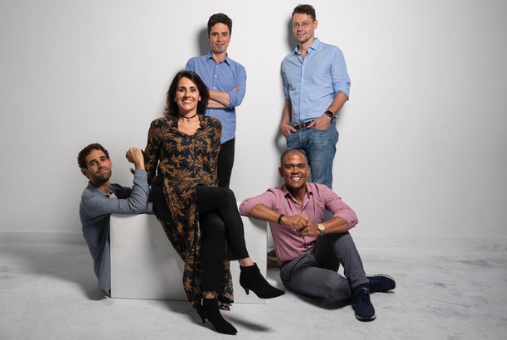Driven by total investments of €700,000 (USD 794,000), the Franco-Brazilian newstech Headline will go live this year, intending to serve as a content platform for journalists and independent organizations. It has an asset that neither Google, Facebook, or any other Big Tech nor traditional news outlet has managed to put together yet: the combination of monetization and curation of journalistic content.
“You have newsrooms shrinking in size and doing massive lay-offs of 50, 60 people at once. And laying off the best guys because the advertising-based business model no longer exists. (...) The result is that there are many good people out there organizing themselves or going solo. Excellent quality journalism, but without a platform, scale, money, marketing, essentially failing when it comes to reaching out to the public,” one of Headline's founders, Danilo Rocha Lima, told LatAm Journalism Review (LJR).
Rocha Lima refers to the internet's transformations on journalists and news organizations in the last 30 years. On the one hand, the internet allowed a diverse environment of new organizations born in the digital domain. On the other, these organizations are small, dispersed, and do not have the same firepower that traditional journalism companies had in the past. The result is quality journalism with less visibility and impact and an ongoing struggle for financial survival.
Sembramedia's media directory lists 1,033 Spanish-language digital native journalistic ventures in the Americas and Spain. About 45% (469 news outlets) have teams of up to six full-time people. Another 15% (159 organizations) have more than six full-time employees. And the remaining 40% (405 ventures) cannot afford even one full-time person. Sembramedia does not have data on Brazil, but nothing suggests that Brazilian digital native organizations face a different reality.

The platform is currently in a testing phase and should be launched in the first semester with up to ten partner newsrooms. (Photo: Screenshot)
“Headline's idea is to provide independent journalism with those things that independent journalism lacks the most: scale of content production; access to quality technology, worthy of today's great internet platforms; access to data-driven tools, intelligent paywall, machine learning, customization, recommendation, geolocation and everything behind it all; and, a fourth element, a coherent business plan to leverage all of this,” another Headline founder, Andrei Netto, told LJR.
Headline was born in France, where the five founders lived. They met while working as Brazilian news outlet correspondents in Paris. The centrality of social networks and local independent journalists in the coverage of the Arab Spring events in the Middle East in 2011 served as an inspiration. During the digital revolution, why are professional journalists not properly remunerated when they work independently, without connection to large media groups?
“We discovered, talking to the founders of independent news outlets, that the barriers they faced, the pain, were the same. So we decided we couldn't just repeat the experience and face the same pain. Let's try to offer something to fix their pain,” Netto said.
Professor and researcher Samuel Lima, from the graduate program in journalism at the Federal University of Santa Catarina (UFSC), believes that Headline faces two main challenges in order to take off. The first is to be able to provide the necessary support for partner organizations or independent journalists to gain scale. And the second is to negotiate a doable return on investment. “The way each partner is remunerated will show what the partner produces or not,” Samuel Lima told LJR.
“[Independent journalism] has a problem of scale. For example, in Joinville [a city of 597,000 inhabitants in southern Brazil], 15,000 to 20,000 people said they were willing to pay out of pocket to finance local journalism. But how is this organized? Another example is a small independent journalism organization in the interior of Piauí [state in the Northeast Region]. How can they [Headline] support them to gain visibility in the region to an audience of, say, 100,000 people? The issue of scale is crucial,” Samuel Lima said. He coordinates the annual Profile of Brazilian Journalism survey and is one of the organizers of the book Local Journalism at the Service of the Public.

Headline founders: Mario Camera, Andrei Netto (standing), Felipe Paiva, Deborah Berlinck, Danilo Rocha Lima (sitting). (Photo: Courtesy)
Compensation for journalists
Independent digital journalism largely relies on social networks as a dissemination tool: Facebook, Twitter, Instagram, Whatsapp, and others are essential platforms for broadcasting journalistic content. Despite being among the most successful companies globally, these platforms pay little or nothing to the producers from what they earn in advertising. Through Google AdSense and YouTube, Google pays based on traffic but makes journalistic content compete with other content, such as viral memes, entertainment, cooking, and even fake news.
“If you compare it to the big platforms, Silicon Valley’s culture is, 'I created the platform. The content is yours. I offer an algorithm that regulates, delivers, etc., but the content is yours. And, in fact, in journalism, this cannot work because it opens the door to all kinds of journalistic fraud. So, in journalism, you need to have quality curation. You must have quality editing. Curation means editing,” Netto said.
For its debut, scheduled for the first half of 2022, the platform is negotiating with ten digital organizations native to Brazil. In the future, Headline will accept applications from other news outlets and also from independent journalists.
“They will, a priori, be selected by our editorial committee. [Journalists] register on the platform, apply for membership, and submit content. And then there is an evaluation with the editorial committee”, Rocha Lima explained.
Headline intends to transfer up to 70% of its total revenue—through subscriptions and content licensing—to journalists and independent organizations participating on the platform. The remuneration of the producers will be based on an objective measure: time of consumption of the information. Another long-term journalistic criterion will be added: the political and social impact, as defined by the editorial committee.
“[Our research shows that] there is an apparent group [of readers] who want content curation, that is, few well-written content pieces, well articulated. There is another group that wants hard news in their veins. And there is a third group that wants opinion and analysis. And Headline was built from that. Headline's journalistic premise was built from these three conclusions,” Netto said.
![Hélio Santos invested €500,000 (USD 567,000) in the Headline platform: “I am not investing as a donation, of course … [but] I want to help make a change.” (Photo: Courtesy)](https://latamjournalismreview.org/wp-content/uploads/2022/02/Helio-Santos-investiu-E-500-mil-na-plataforma-Headline_-nao-estou-investindo-para-doar-e-claro-…-mas-quero-ajudar-a-fazer-uma-mudanca.-Foto-Cortesia-300x201.png)
Hélio Santos invested €500,000 (USD 567,000) in the Headline platform: “I am not investing as a donation, of course … [but] I want to help make a change.” (Photo: Courtesy)
“I'm not investing as a donation, of course. However, I have more patience than a conventional venture capitalist; I have a more long-term vision. In two years or one year, I don't need to multiply this investment by ten. That's not the goal,” Santos told LJR. “I want to help make a change. So if I can help make a change, it's morally good. And the money, the profit, will be a natural consequence of whether it’s a good thing or not.”